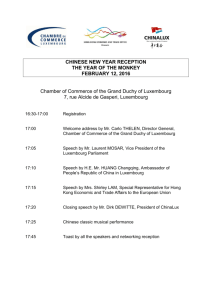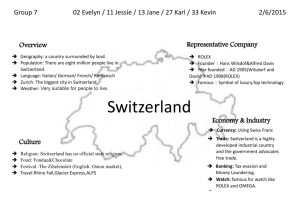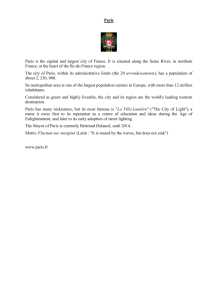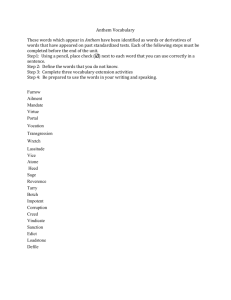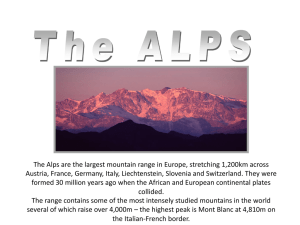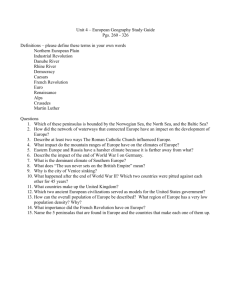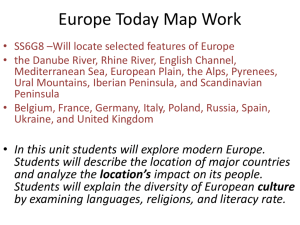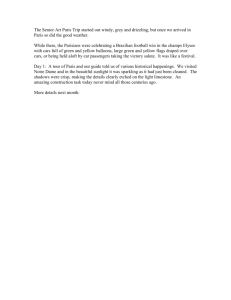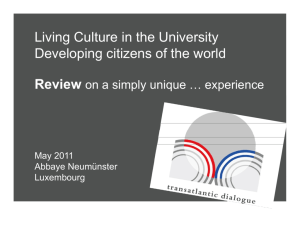Journey to European Countries
advertisement
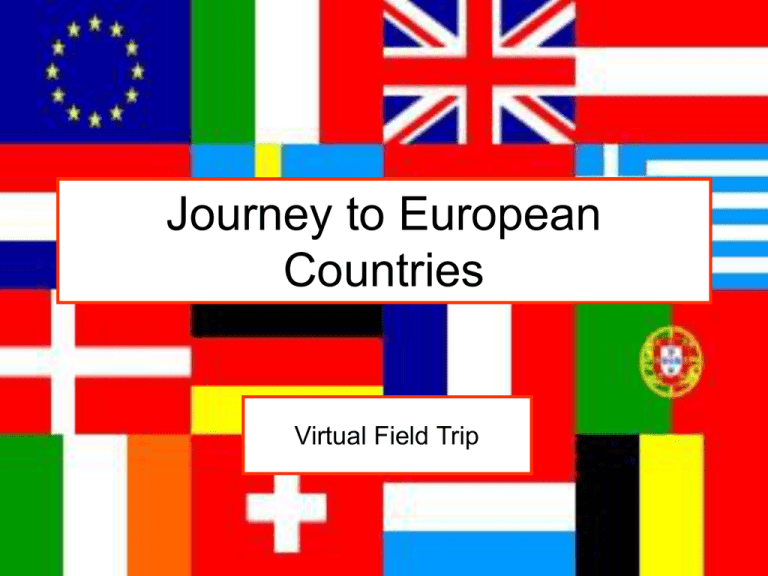
Journey to European Countries Virtual Field Trip Europe Physical Characteristics • The Volga River is the longest river in Europe. NEXT • The Strait of Gibraltar is a narrow body of water that connects the Mediterranean Sea and the Atlantic Ocean. It is one of the world's most important sea lanes. NEXT • The English Channel is a body of water between England and France that connects the Atlantic Ocean and the North Sea. NEXT Economic Characteristics • Chernozem is a very black topsoil, rich in humus, typical of cool to temperate semiarid regions, such as the grasslands of European Russia. • Europe is known for its advanced farming techniques, high crop yields, fertile soils, black earth, and well-developed infrastructure. NEXT • The "Chunnel" links the United Kingdom and France. It opened in 1994. The Channel Tunnel lies beneath the English Channel. It consists of three parallel tubes, two of which carry trains between the United Kingdom and France. The third tube is a service tunnel. This tube supplies fresh air and maintenance access to the rail tubes, and could be used for emergency evacuation. NEXT • The differences in Western and Eastern European industrial development is due to differing economic systems in prior years. • Trade is important, especially to island nations; interdependence NEXT • European Union (EU) is an organization of 27 European countries that promotes cooperation among its members. The members cooperate in many areas, including politics and economics. • The union's members are Austria, Belgium, Bulgaria, Cyprus, the Czech Republic, Denmark, Estonia, Finland, France, Germany, Greece, Hungary, Ireland, Italy, Latvia, Lithuania, Luxembourg, Malta, the Netherlands, Poland, Portugal, Romania, Slovakia, Slovenia, Spain, Sweden, and the United Kingdom. NEXT Cultural Characteristics • Europe has many ethnic groups--languages, religions, customs • Sporadic conflict among groups (wars and revolutions) • Spread of European culture to many other parts of the world (exploration, colonization, imperialism) NEXT • Europe is highly urbanized • Europe is one of the world’s most densely populated areas • Windmills and castles are among the sights NEXT Western Europe United Kingdom (Great Britain) Click to hear the national anthem Physical Characteristics Economic Characteristics Cultural Characteristics • Thames River is the most famous and most important river in England. The Thames is also one of the longest rivers in England. NEXT • Grampian Mountains, also Grampian Hills, mountain system, central Scotland, forming the natural division between the Lowlands and Highlands. HOME • The Industrial Revolution began in Britain (a country now known as the United Kingdom) during the late 1700's. Great Britain is a major industrial and trade country. HOME • London is the center of culture and trade. It is home to the 2nd most people of all European countries. NEXT • Westminster Abbey is a major landmark in London, and the site of coronation for the English monarchy. NEXT • Big Ben is the name given to the bell, clock, and clock tower of the Houses of Parliament in the Palace of Westminster in London. NEXT Capital City Language Religion London English Christian TO FRANCE Western Europe France Click to hear the national anthem Physical Characteristics Economic Characteristics Cultural Characteristics • The Seine River and its branches form the chief commercial waterway of France. The Seine River flows around the Ile de la Cite (Island of the City). NEXT • The Rhine River is an important inland waterway in Europe. It is about 820 miles (1,320 kilometers) long and drains an area of about 86,700 square miles (224,600 square kilometers). NEXT • The Rhone River is an important commercial waterway of France. It is famous for the beauty of its valley. NEXT • Alps are the largest mountain system in Europe. The snow-capped peaks and sheltered, peaceful valleys of the Alps are among Europe's most spectacular sights. NEXT • Pyrenees is a mountain chain that forms a natural barrier between France and Spain. NEXT • Massif Central, great mountainous plateau, S central France, covering almost a sixth of the surface of the country. HOME • The Rhine River and the Seine River have both been threatened by air and water pollution. NEXT Capital City Paris Language French Religion Catholic NEXT • Paris is the center of culture and trade. It is home to the 3rd most people of all European countries. NEXT • The Cathedral of Notre Dame, is a famous cathedral in Paris. It stands on the Ile de la Cite, a small island in the Seine River, in the center of Paris. NEXT • The Arc de Triomphe, in Paris is the largest triumphal arch in the world. It is known as the Arch of Triumph in English. NEXT • The Louvre is one of the largest and most famous art museums in the world. The Louvre covers more than 40 acres (16 hectares) on the north bank of the Seine River in Paris. TO GERMANY Western Europe Germany Click to hear the national anthem Physical Characteristics Economic Characteristics Cultural Characteristics The Danube River is the second longest river in Europe. The Danube flows 1,770 miles from southern Germany to eastern Europe. NEXT • The Black Forest is a mountain district in southwestern Germany, covered with forests of dark fir and spruce trees. NEXT • The North European Plain extends across the northern reaches of the country; this flat, lowland terrain is dissected by numerous bogs, rivers and streams, and is mostly used as farmland. NEXT • The Black Forest and the Danube River are both threatened by air and water pollution. NEXT • Ruhr valley is famous for its industrial history, originally based on coal mining and steel production and now benefiting from its industrial mix of energy production, environmental technologies and modern service industries. NEXT Capital City Language Religion Berlin German Protestant (34%) Catholic (34%) Muslim (4%) unaffiliated/others (28%) NEXT • Berlin is the center of culture and trade. Berlin is home to the most people of all European countries. Berlin is Germany's capital and largest city. It has a population of about 3 1/2 million and is one of Europe's great cultural, political, and economic centers. TO SWITZERLAND Western Europe Switzerland Click to hear the national anthem Physical Characteristics Economic Characteristics Cultural Characteristics • The Rhine River is an important inland waterway in Europe. The river rises in eastern Switzerland. It forms part of the borders of Switzerland, Liechtenstein, Austria, France, and Germany. NEXT • The Alps are the largest mountain system in Europe. The snow-capped peaks and sheltered, peaceful valleys of the Alps are among Europe's most spectacular sights. NEXT • The Rhine River is threatened by air and water pollution. • Switzerland has a well-educated workforce Industrial and technological societies Banking NEXT Capital City Language Religion Bern German, French, Italian, Romansch Catholic, Protestant Switzerland is home to many different ethnic groups and religions. Four (4) national languages are spoken in Switzerland. TO Luxembourg Western Europe Luxembourg Click to hear the national anthem Physical Characteristics Economic Characteristics Cultural Characteristics Luxembourg is smaller than the state of Rhode Island. (Rhode Island is the smallest state in the US) NEXT • Luxembourg is very prosperous. Many businesses have headquarters there. Luxembourg is home to the 2nd largest steel producing company in Europe. NEXT Capital City Luxembourg Language Letzeburgish, German, French Religion Catholic NEXT Next Stop… Southern Europe
